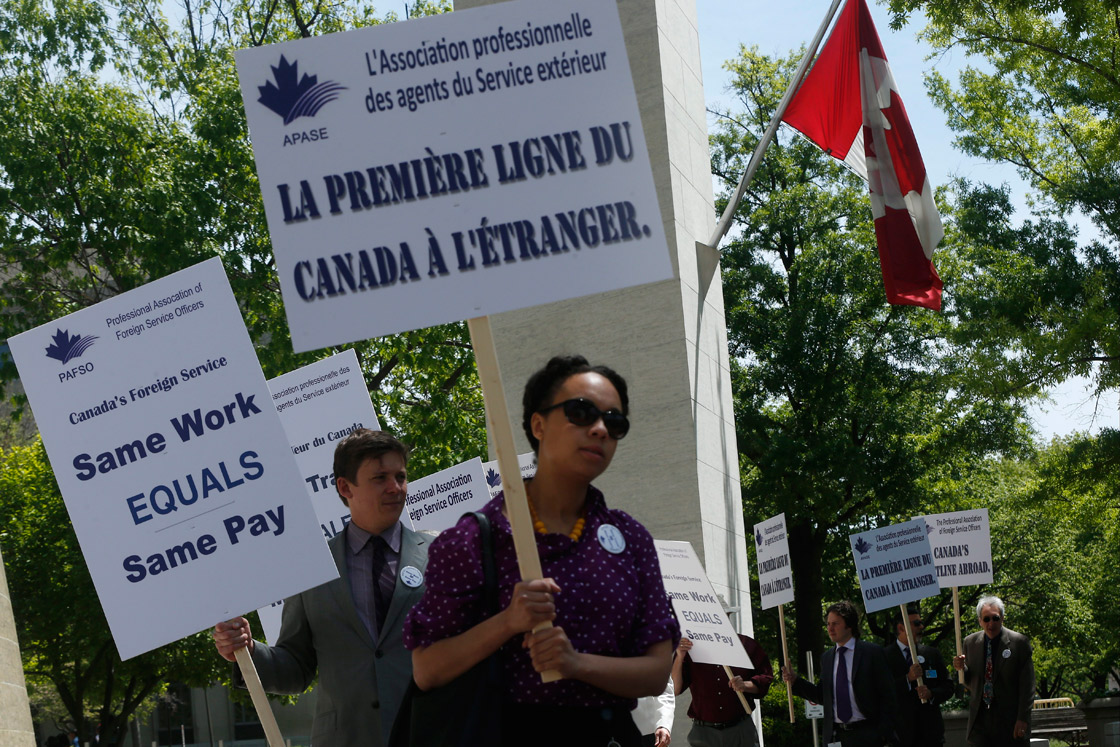OTTAWA – Canada’s foreign service officers are targeting Prime Minister Stephen Harper’s trip to Europe next week as a part of a bold tactic to rejuvenate stalled contract talks.

The protest started Thursday as about 400 union members walked off the job from the Pearson Building, headquarters for the Department of Foreign Affairs.
They were followed by the walkout of another 100 foreign service officers at a dozen key Canadian missions abroad.
These include London, Paris and Dublin – destinations for a major European trip by Harper next week that includes a stop at the G8 summit.
Timothy Edwards, president of the Professional Association of Foreign Service Officers, said the new, drastic measures will continue until Treasury Board returns to the bargaining table with a meaningful offer.
After a four-month hiatus, the two sides restarted talks this week, but they broke down when Treasury Board did not come up with a new wage offer, Edwards told The Canadian Press.
“We were told they had not obtained approval, approval had not been granted by the government,” Edwards said. “We were told by the top levels of government that this was a political decision.
“It’s the same offer we’ve been looking at for a year and a half so we rejected it on the spot. There was nothing new there.”
The union then decided “to escalate our pressure tactics, now specifically targeting the political level.”
The 1,350-member union has been without a contract since mid-2011 and has been in a legal strike position since April.
The union is trying to force Treasury Board to address a core grievance: that its members are paid $10,000 to $14,000 a year less than their counterparts who do similar work in other federal departments.
While essential workers will remain on the job, the walkouts will stall processing of immigration applications and other consular work, as well as things such as trade talks and ministerial visits.
“So we will now be targeting all of the government’s top international priorities, as well as all cabinet-level travel, including that of the prime minister, which we hadn’t touched until now,” said Edwards.
“The ramifications on the immigration side, I think you can probably guess. It’s going to mean a massive backlog and huge reduction in the pace and volume of the processing of visas and permanent resident applications in these locations.”
In other missions, it means no work on Canadian trade priorities, market access issues, promotion of Canadian goods and services, as well as attraction of Canadian investment, he said.
The union began protesting in April after declaring it was in a legal strike position. Since then, it has staged rotating activities, including a picket by well-dressed diplomats in Washington last month.
The missions involved in Thursday’s walkout include Tokyo, Tel Aviv, Ramallah and, Hong Kong, as well as the immigration sections at Canada’s two largest visa-processing centres in Beijing and New Delhi.
The action was meant to catch the government off guard.
In April, a spokeswoman for Treasury Board Secretary Tony Clement, said the government would view any strike as unfortunate.
“The foreign service is a highly sought-after and well-paid posting,” the spokeswoman said, reading from prepared talking points. “The government will continue to bargain with PAFSO in good faith to reach a reasonable settlement that is fair to workers and taxpayers.”
The labour unrest comes as Canada tries to finalize a free-trade deal with Europe and seeks to expand markets in Asia and the Middle East.



Comments